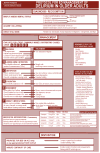Assessment and Management of Delirium in Older Adults in the Emergency Department: Literature Review to Inform Development of a Novel Clinical Protocol
- PMID: 26218485
- PMCID: PMC4633298
- DOI: 10.1097/TME.0000000000000066
Assessment and Management of Delirium in Older Adults in the Emergency Department: Literature Review to Inform Development of a Novel Clinical Protocol
Abstract
Delirium occurs frequently in older patients in the emergency department (ED), is underrecognized, and has potentially serious consequences. Despite its seriousness, delirium is frequently missed by emergency providers, and patients with unrecognized delirium are often discharged from the ED. Even when it is appropriately recognized, managing delirium in older adults poses a significant challenge for ED providers. Geriatric delirium is typically caused by the interaction of multiple factors, including several that are commonly missed: pain, urinary retention, constipation, dehydration, and polypharmacy. Appropriate management includes nonpharmacological management with medication intervention reserved for emergencies. We have developed a new, comprehensive, evidence-based protocol for diagnosis/recognition, management, and disposition of geriatric delirium patients in the ED with a focus on identifying and treating commonly missed contributing causes.
Figures
References
-
- Aghaienia N, Brahm NC, Lussier KM, Washington NB. Probable quetiapine-mediated prolongation of the QT interval. Journal of Pharmacy Practice. 2011;24(5):506–512. - PubMed
-
- Aguirre E. Delirium and hospitalized older adults: a review of nonpharmacologic treatment. Journal of Continuing Education in Nursing. 2010;41(4):151. - PubMed
-
- Alexopoulos GS, Streim JE, Carpenter D, Docherty JP. Expert consensus guidelines for using antipsychotic agents in older patients. Journal of Clinical Psychiatry. 2004;65(Suppl 2):1–105. - PubMed
-
- Allen MH, Currier GW, Carpenter D, Ross RW, Docherty JP. The expert consensus guideline series. Treatment of behavioral emergencies 2005. Journal of Psychiatric Practice. 2005;11:5–108. - PubMed
-
- Angelini G, Ketzler JT, Coursin DB. Use of propofol and other nonbenzodiazepine sedatives in the intensive care unit. Critical Care Clinics. 2001;17(4):863–880. - PubMed
Publication types
MeSH terms
Grants and funding
LinkOut - more resources
Full Text Sources
Medical



